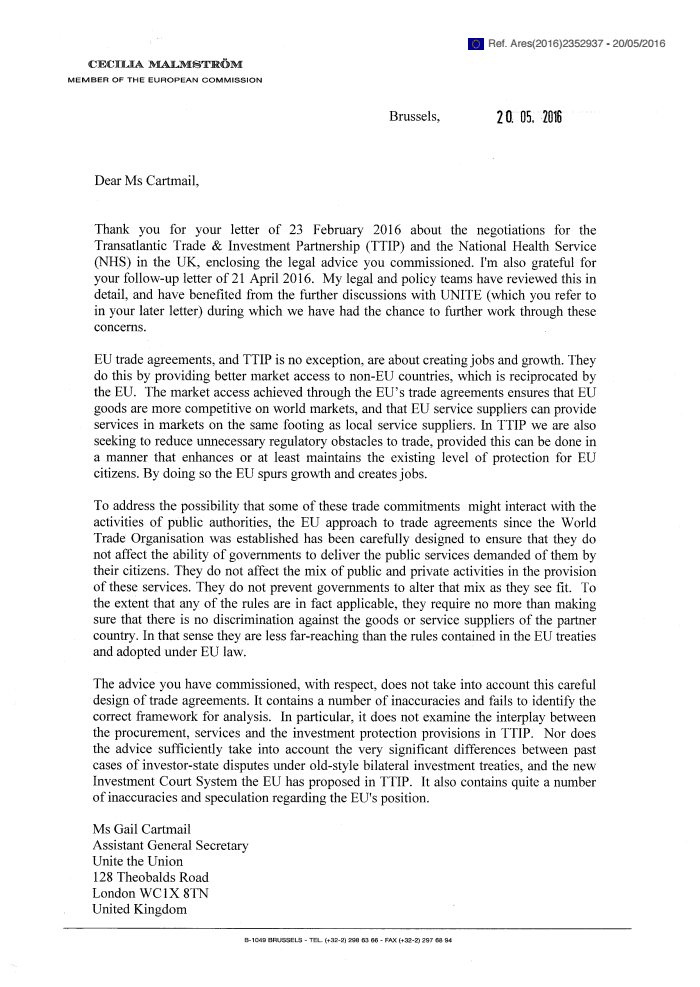
The European Union's trade commissioner has issued a lengthy rebuttal to claims the Transatlantic Trade and Investment Partnership (TTIP) treaty could be used to sue the NHS.
In the letter, commissioner Cecilia Malmström writes that treaties like TTIP, "do not affect the mix of public and private activities in the provision of these services. They do not prevent governments to alter that mix as they see fit."
Earlier today, BuzzFeed News revealed that Britain's biggest trade union, Unite, wrote in April to Malmström to warn there are “areas of the TTIP which could be used to sue the UK Government over decisions about the NHS." This afternoon, Malmström has published her reply.
In February the union received legal guidance that said there was a “real and serious risk” to the NHS from TTIP, a scheme to cut tariffs and regulatory barriers between the EU and US.
The government says that the deal could boost the UK economy by as much as £10 billion by reducing regulatory costs and creating a more integrated marketplace.
However, politicians, unions, and campaigners are concerned the deal could give American multinationals the right to sue the UK government if it ever tried to take privatised health services back into public hands.
Unite sent its letter after a private meeting between the EU’s lead TTIP lawyer, Colin Brown, and the union’s legal counsel, Michael Bowsher QC and Azeem Suterwalla.
In her reply, seen below, Malmström tells Unite: "The advice you have commissioned, with respect, does not take into account this careful design of trade agreements. It contains a number of inaccuracies and fails to identify the correct framework for analysis."
In the letter that prompted her response, sent on 21 April, Unite assistant general secretary Gail Cartmail claimed that the meeting earlier that month between the union’s lawyers and those representing the EU “left us clear that there are still areas of TTIP which could be used to sue the UK Government over decisions about the NHS. It was also clear that in the end our concerns must be addressed by you at the political level.”
Cartmail also wrote: “[The EU’s lawyer] was surprisingly unable to confirm that the European Commission would agree to a TTIP NHS exemption if it was demanded by the UK Government.”

The letter noted that Malmström had said in February she planned to rework parts of the agreement to protect the NHS, but added: “Since then you have proposed a new Investment Court System but you have not addressed the core issues that we have been raising.”
Yesterday, The Guardian reported that David Cameron had been forced to accept an amendment to the Queen’s Speech calling for the NHS to be left out of the deal, after it had been signed by Tory backbenchers, along with Labour, SNP, and Green MPs. Members of the official campaign to leave the EU, Vote Leave, told the newspaper they were not reassured by the statement.
Jeremy Corbyn, the Labour leader, backed the amendment, saying: “I would personally go much further because my concerns about TTIP are not just about the effect on public services but also the principle of investor protection that goes within TTIP-planned rules, which would in effect almost enfranchise global corporations at the expense of national governments.”
Cartmail told BuzzFeed News: “Legal advice from a top QC in EU law clearly shows TTIP poses a real and serious risk to the NHS. A recent meeting between Unite, its lawyers, and the European Commission left it clear that TTIP could be used to sue the UK government over decisions about the NHS.
“The only way to neutralise that threat is for David Cameron to give a cast-iron guarantee that he will exclude the NHS from the trade agreement. This is the only way to protect our health services from irreversible privatisation. Other countries have secured exemptions – there is no reason why the UK can't do the same."

